Overview
To maintain motivation to eat healthy, individuals should focus on understanding the psychological factors influencing their food choices and implement practical strategies such as meal planning, keeping a food journal, and seeking social support. The article emphasizes that by recognizing emotional triggers, setting realistic goals, and utilizing resources like wellness coaching, one can cultivate a positive mindset and sustainable habits that promote healthier eating.
Introduction
In a world where health and wellness are paramount, understanding the psychological underpinnings of healthy eating motivation can transform not only individual habits but also foster a supportive culture within teams. The intricate interplay of self-efficacy, emotional connections to food, and societal influences shapes our dietary choices more than one might realize.
By delving into these psychological dynamics, individuals can identify their personal motivations and develop strategies to overcome emotional triggers that lead to unhealthy eating patterns. This article explores practical techniques—from meal planning to leveraging social support—that empower individuals to sustain their commitment to healthier eating.
By embracing these insights and tools, teams can thrive together, cultivating an environment where healthy choices are not just encouraged but celebrated.
Understanding the Psychology of Healthy Eating Motivation
The motivation to eat healthy is deeply intertwined with various psychological factors, such as self-efficacy, emotional connections to food, and societal influences. A systematic review that screened 700 articles and analyzed 300 revealed significant insights into how psychological factors affect food choices, emphasizing the importance of understanding these dynamics. Furthermore, demographic factors and depressive symptoms have been shown to explain 36.9% of food and non-alcoholic beverage disorders, highlighting the quantitative influence of psychological aspects on dietary habits.
To cultivate a positive mindset towards healthy food choices, start by recognizing your motivation to eat healthy, which may arise from aspirations for better health, enhanced appearance, or improved overall well-being. Reflecting on past successes and challenges can illuminate your motivation to eat healthy. It's also crucial to recognize emotional triggers that may lead to unhealthy eating patterns, like stress or boredom.
Developing effective strategies to cope with these feelings—without turning to food—can significantly bolster your journey towards healthier choices. For instance, one client shared, "Working with my coach helped me realize that I often turned to snacks when stressed; now I use exercise as a healthier outlet." The case study titled 'Influence of Romantic Relationships on Food Choices' suggests that couples often eat together, and their food preferences can significantly influence each other's dietary decisions.
As you embark on this journey, consider the personalized support and guidance available through experienced coaches who utilize evidence-based techniques to help you make lasting lifestyle changes. As another client noted, "The coaching I've received has changed my perspective on food and fitness—it's not merely about losing weight; it's about feeling empowered and well." As Susan Albers, a renowned psychologist, states, By being mindful of your habits and relationship with food, you can empower yourself and reveal the way to eat that is truly nourishing to your body and mind.
Comprehending these psychological dynamics, along with professional coaching, not only improves individual resilience but also establishes the foundation for a supportive culture that promotes nutritious habits within your team. Let's discuss how we can help you thrive in the modern world while learning from the wisdom of the past. Contact us today to schedule a consultation!
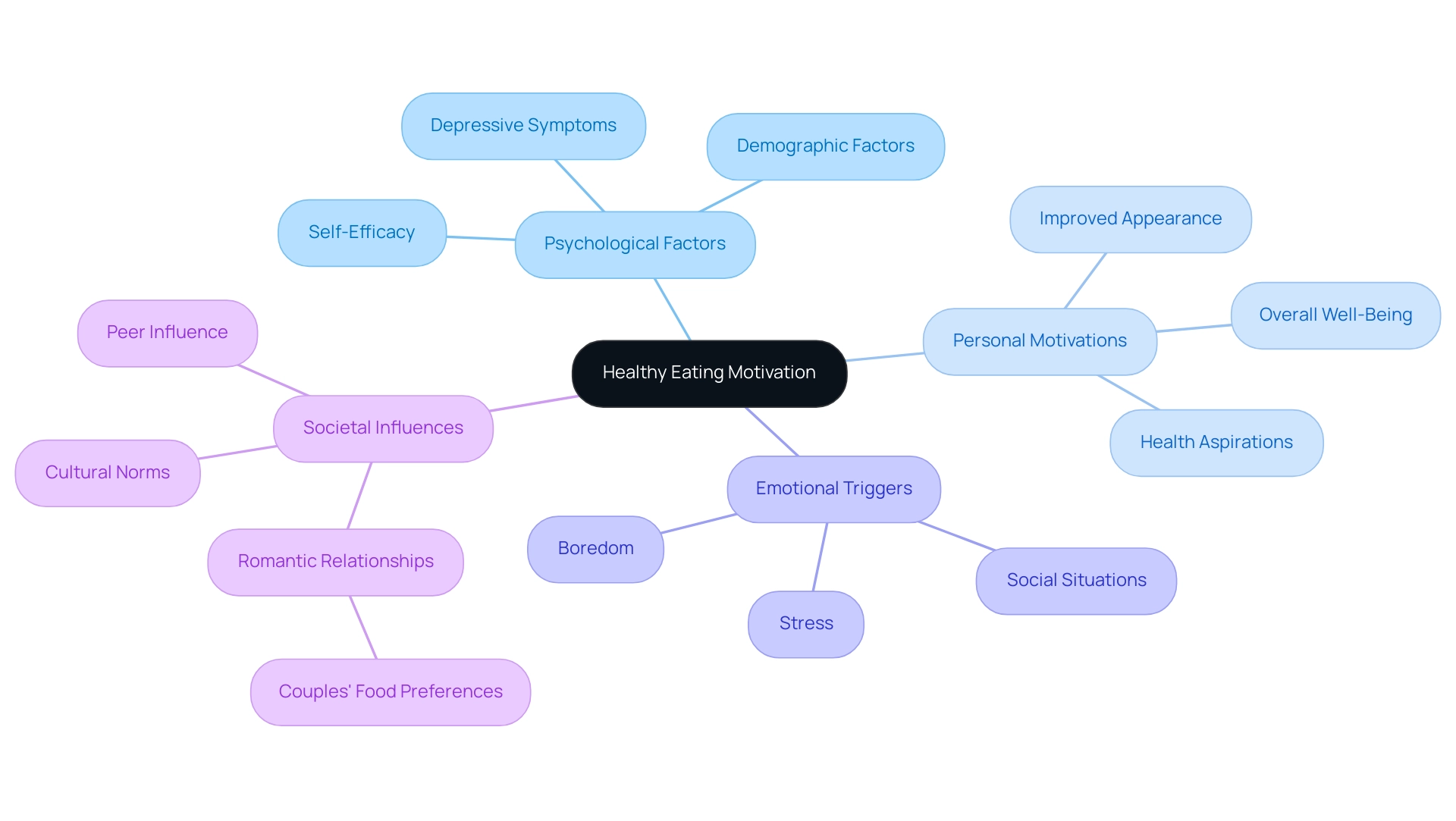
Practical Strategies to Sustain Your Healthy Eating Motivation
Maintaining motivation to eat healthy can be both rewarding and challenging. To help you stay on track, consider implementing these practical strategies, enhanced by our wellness coaching app, which conveniently consolidates all your health tools in one place:
-
Keep a Food Journal: Documenting your meals not only fosters accountability but also enables you to identify dietary patterns, making it easier to adjust your habits for better health.
Our app offers digital journaling tools that align with the trend towards web-based diaries, enhancing your accountability.
-
Create a Vision Board: Bring your goals to life by crafting a vision board filled with inspiring images and motivational quotes.
Our app allows you to visualize your aspirations, keeping you engaged and focused.
-
Celebrate Small Wins: Acknowledge your progress, no matter how minor it may seem.
With features that enable you to track and celebrate achievements, our app reinforces positive behavior.
-
Stay Informed: Maintain your enthusiasm by frequently interacting with articles or videos on nutritious food within the app.
Knowledge serves as a powerful motivator, and our resources are designed to give you the motivation to eat healthy.
-
Mix It Up: Experimenting with new recipes and ingredients keeps your meals exciting.
The app provides personalized nutrition guidance and diverse recipes to prevent monotony.
Moreover, utilizing consistent consumption patterns can aid in sustaining nutritious dietary practices. As Dr. Greenberg notes, despite the struggles with food journaling, nothing seems to help, but integrating these techniques with the support of our wellness app can transform your approach to nutritious eating.
Moreover, the daily programming feature ensures that you stay on track with your goals and commitments. The case study titled 'Complementing Current Diet Methodologies' highlights the importance of designing strategies that promote sustainable diets, reinforcing the need for personalized food recommendations. By incorporating these techniques into your daily routine through our app, you can maintain your motivation to eat healthy and make lasting lifestyle changes that benefit your overall well-being.
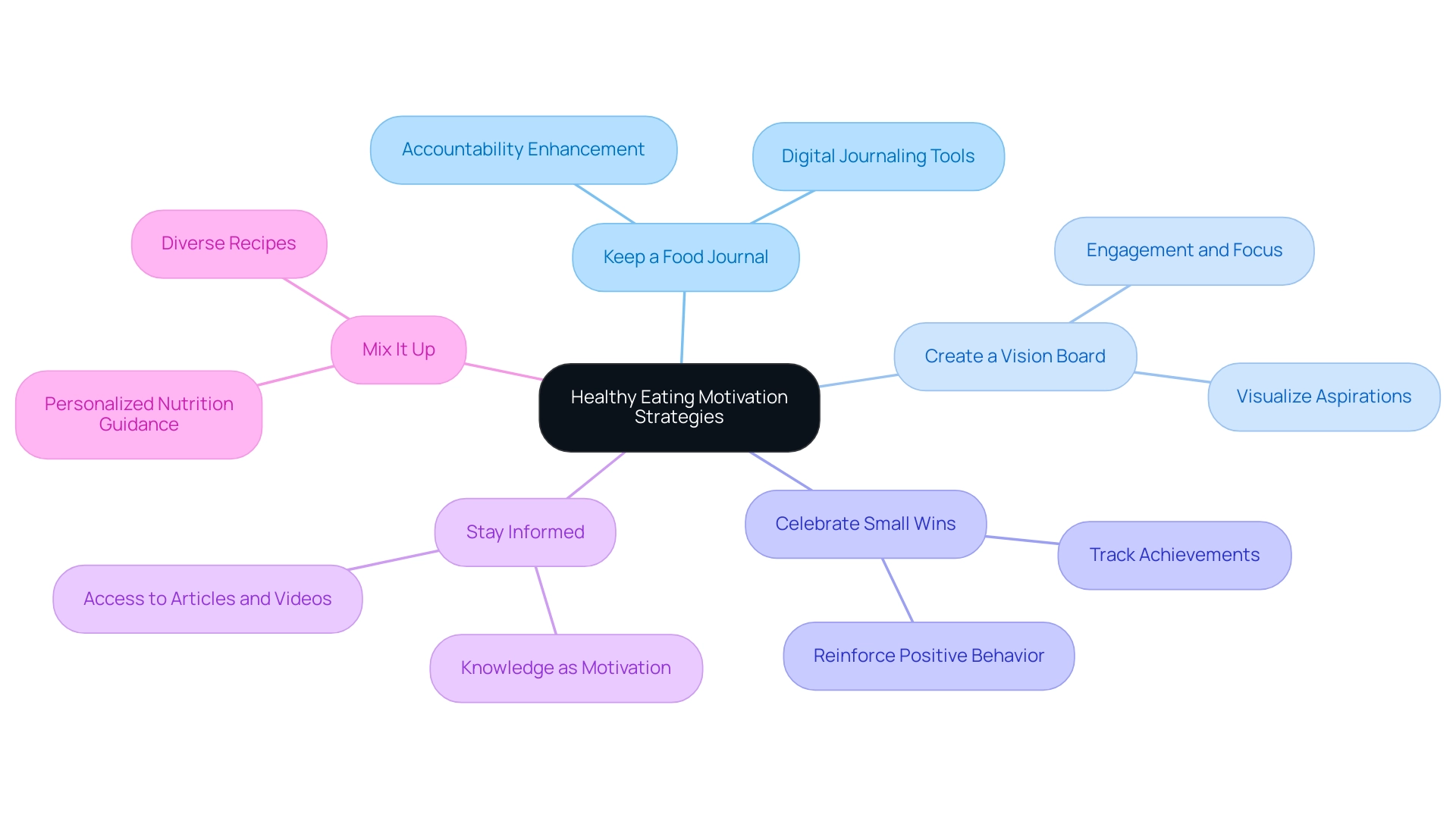
The Role of Meal Planning in Boosting Motivation to Eat Right
Embracing meal planning can profoundly elevate your motivation to eat healthy by introducing structure and alleviating the anxiety associated with spontaneous food choices. Allocate a specific time each week to thoughtfully map out your meals, taking into account your busy schedule. Opt for recipes that are not only easy to prepare but also aligned with your health objectives.
Create a detailed shopping list based on your meal selections to guarantee that all essential ingredients are readily available. Batch cooking presents a powerful strategy; by preparing meals in advance, you can streamline your weekdays and avoid the temptation of less nutritious options when hunger strikes. Notably, research indicates that a remarkable 41.72% of individuals who do not plan their meals decide what to cook on the fly, which often leads to unhealthy choices.
Additionally, 44.9% of participants expressed that reduced business would enable them to eat healthier. This highlights the essential role of meal planning in promoting healthier dietary habits. Future research should be conducted to address how food availability could potentially influence the relationship observed between meal planning and diet quality.
Furthermore, considering gender-specific time constraints is essential; studies show that men’s time constraints are often linked to work commitments, while women face additional pressures from family responsibilities. By instituting effective meal planning and preparation practices, you empower yourself and your team to make healthier dietary choices, ultimately enhancing overall well-being.
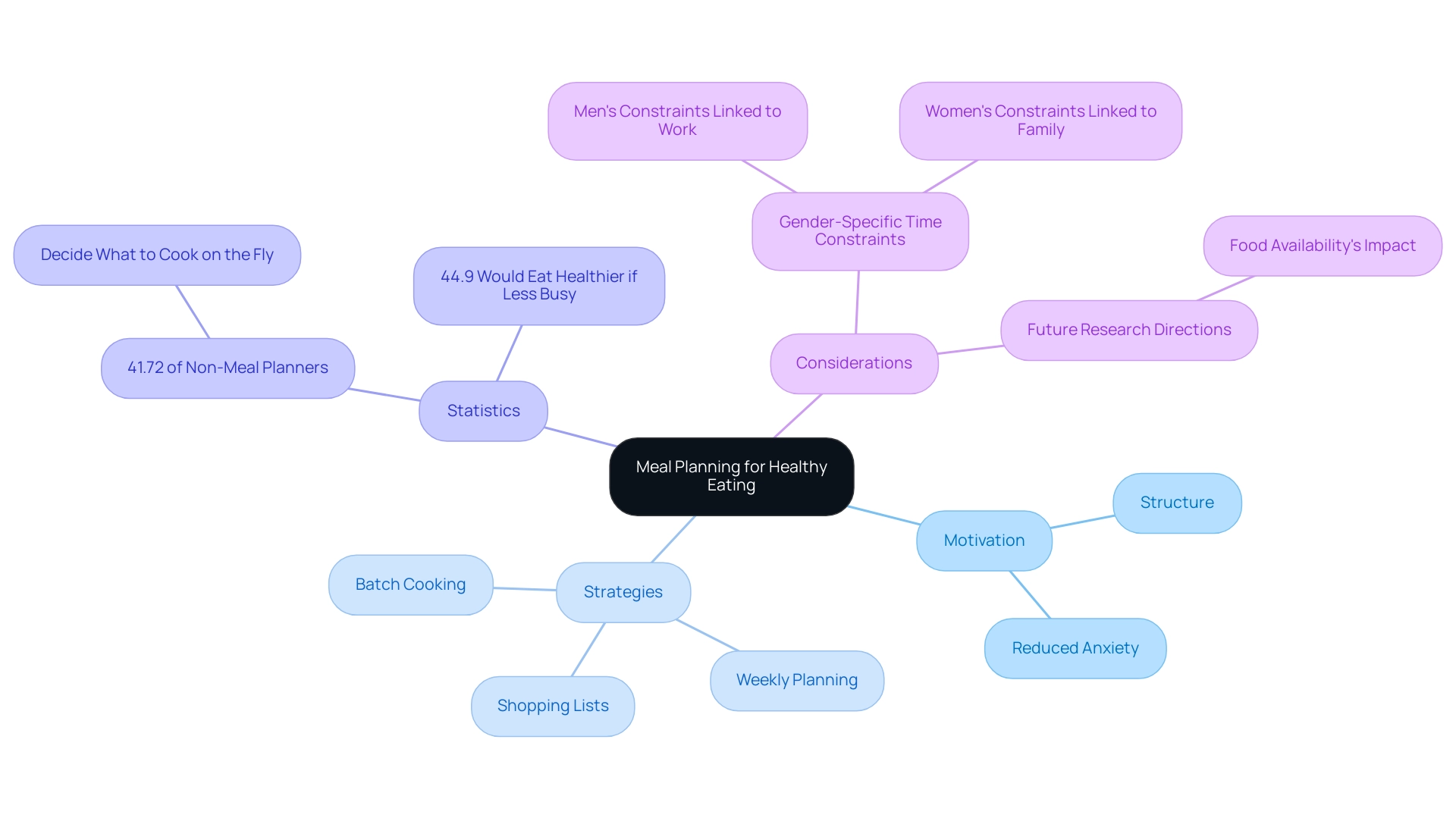
Leveraging Social Support to Enhance Your Healthy Eating Journey
To fully utilize the power of social support in your wellness journey, explore these effective strategies:
-
Join a Group: Engage with local or online communities that prioritize healthy eating. Sharing your experiences not only fosters a motivation to eat healthy but also establishes a strong sense of accountability.
Research shows that social dynamics play a crucial role in eating behaviors, which enhances the motivation to eat healthy choices. In fact, Friend Support for Healthy Eating has a mean score of 4.6±3.9, highlighting its importance.
-
Involve Family and Friends: Openly share your health objectives with loved ones and encourage them to join you in making better dietary choices. This shared commitment can significantly increase your motivation to eat healthy, as individuals are more likely to adhere to their goals when backed by supportive family members. Notably, Parent Support for Healthy Eating has a mean score of 10.1±3.4, underscoring the impact of familial encouragement.
-
Find a Buddy: Partner with a friend who shares similar health aspirations. Together, you can inspire one another, share nutritious recipes, and celebrate your progress, creating a positive feedback loop that strengthens good habits.
-
Attend Workshops or Classes: Join cooking classes or nutrition workshops to connect with similar individuals and acquire new perspectives on nutritious food. These settings not only provide valuable knowledge but also foster community connections.
By surrounding yourself with supportive individuals, you enhance your motivation to eat healthy and create a positive environment that encourages nutritious eating. As Andrea Marcus, PhD, MPH, states, "Social support was determined by a modification of the Rees Social Support Index (SSI), which is the sum of five dichotomized variables addressing emotional support, financial support, marital status, close friends, and religious service attendance." This emphasizes the vital role of social support in fostering healthy behaviors.
Furthermore, the Texercise Select Intervention case study demonstrates how participants reported enhanced consumption of fruits, vegetables, and water, with social support mediating the connection between the intervention and changes in eating habits. Establishing a network that enhances your motivation to eat healthy is crucial for lasting achievement.
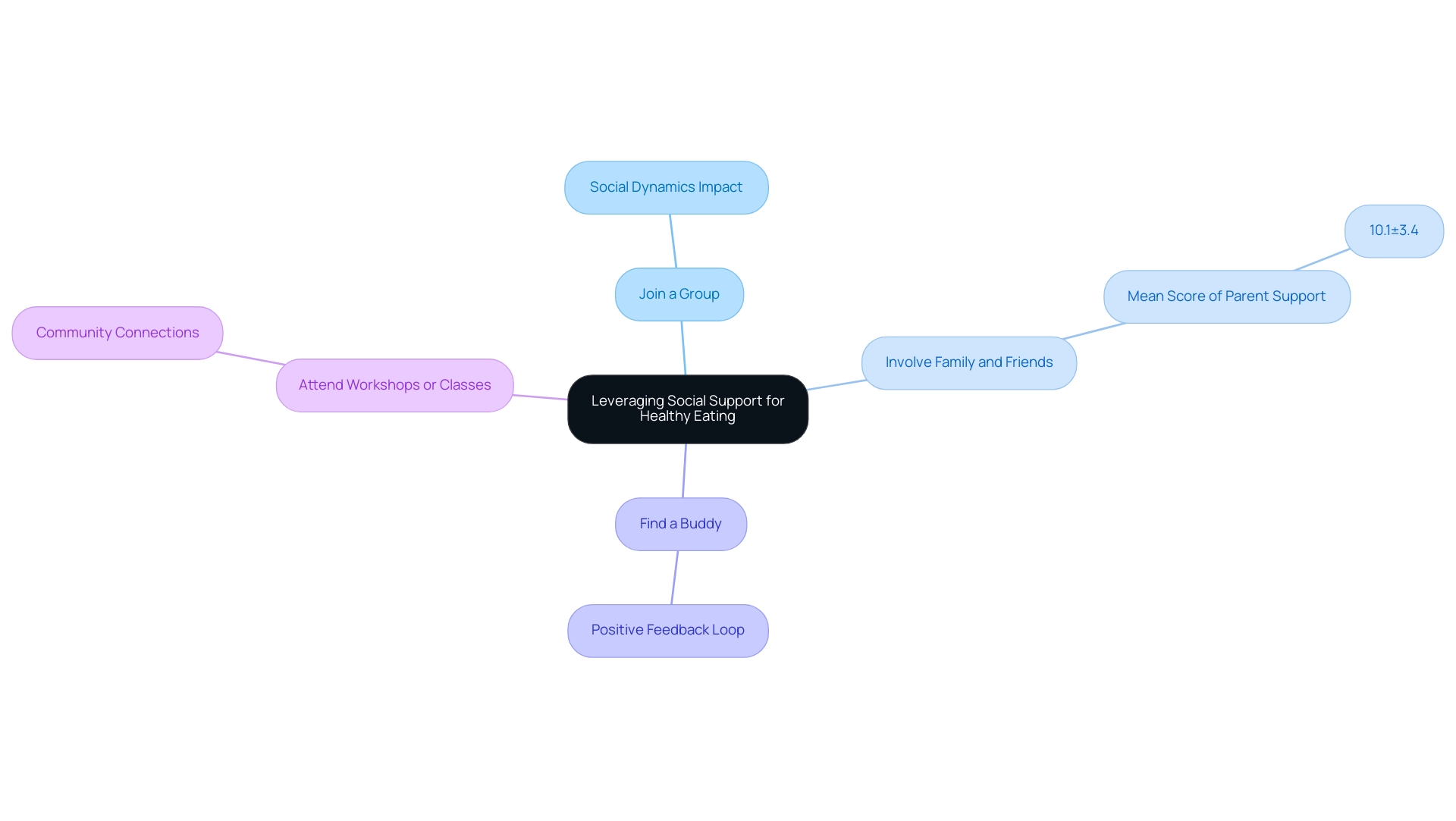
Setting Realistic Goals for Long-Term Healthy Eating Success
Embarking on a journey toward healthier eating requires establishing realistic objectives that provide motivation to eat healthy and foster sustainable change. Here are some empowering guidelines to help you succeed:
- Start Small: Instead of trying a complete food overhaul, begin by making one or two manageable changes. For instance, increase your vegetable intake or reduce sugary drink consumption gradually. This incremental approach can lead to lasting habits.
- Utilize the SMART Framework: To maximize your chances of success, ensure your objectives align with the SMART criteria—Specific, Measurable, Achievable, Relevant, and Time-Bound. For example, aim to incorporate at least three servings of vegetables into your daily meals for a month. Research indicates that objective pursuit intensifies after dietary successes, with J. Reichenberger noting, "Objective pursuit increases more after dietary success than after dietary failure: examining conflicting theories of self-regulation using ecological momentary assessment." This supports the idea that realistic, structured aims lead to sustained motivation.
- Monitor Your Progress: Regularly evaluate your objectives and take the time to celebrate your achievements, no matter how small they may seem. This practice not only fuels your motivation to eat healthy but also reinforces positive behavior changes. A recent study suggests that participants who set higher weight loss goals (>10%) experienced greater success, underscoring the impact of ambitious yet attainable objectives. Notably, the 1-month follow-up sample showed that 52% of participants maintained their dietary changes, highlighting the effectiveness of proper goal-setting.
- Be Flexible: Adaptability is key in your healthy eating journey. Modify your objectives as necessary to align with your progress and changing lifestyle. This flexibility ensures you remain committed to your health objectives even when faced with challenges.
By leveraging our comprehensive wellness coaching app, which offers personalized workouts, nutrition guidance, and daily programming, you can discover your motivation to eat healthy and commit to realistic and structured goals. The app eliminates the hassle of searching for different wellness resources, making your journey more efficient. With features like direct messaging with coaches for personalized support and community engagement, you’ll pave the way toward a sustainable, long-term commitment to healthy eating and well-being for your team.
Remember, every small step counts, and with determination, you can achieve your desired outcomes.
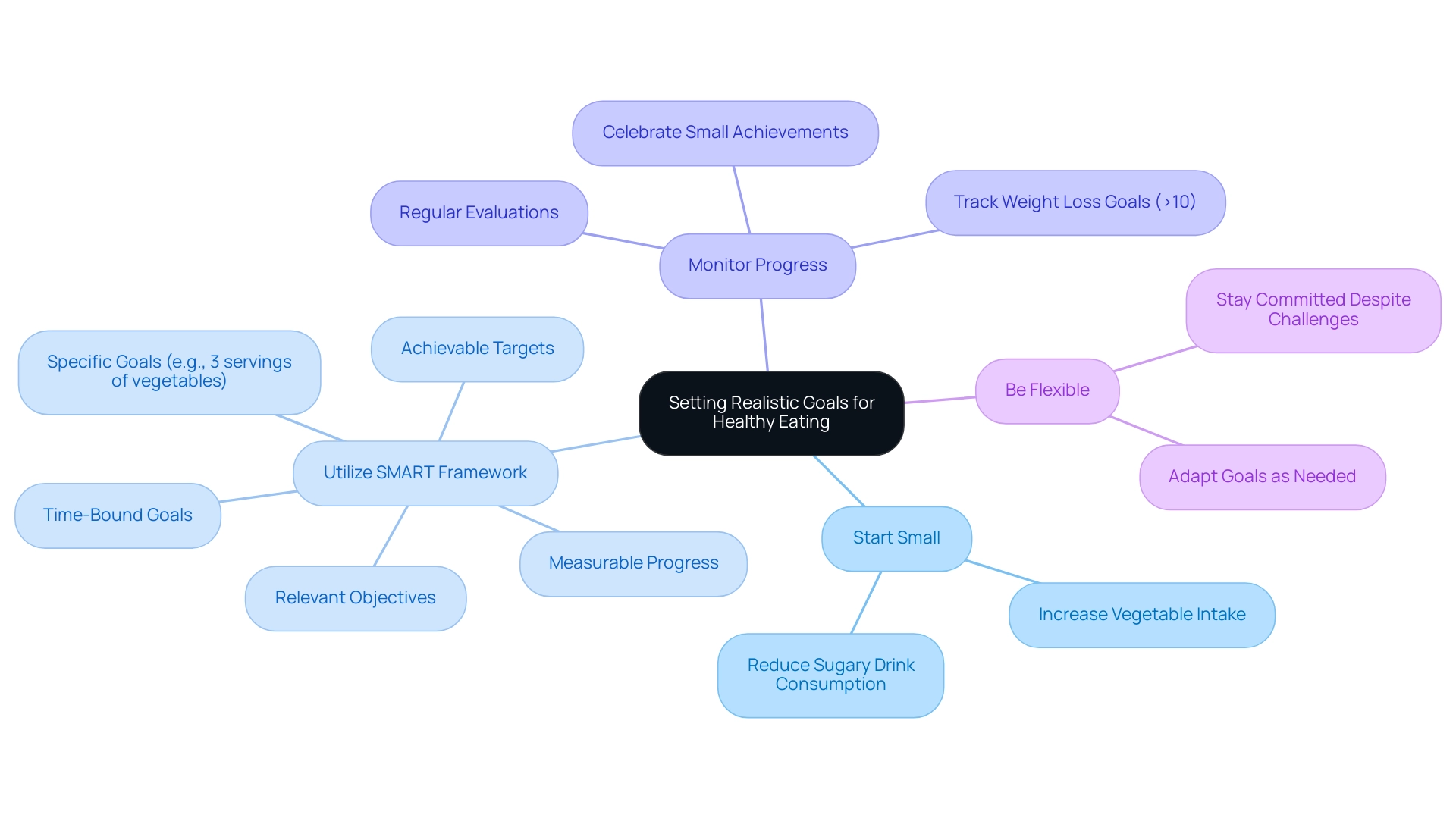
Conclusion
Understanding the psychological aspects of healthy eating motivation is vital for fostering lasting change, both individually and within teams. The interplay of self-efficacy, emotional connections to food, and societal influences shapes our dietary choices significantly. By identifying personal motivations and recognizing emotional triggers, individuals can develop strategies that empower them to make healthier decisions. Practical techniques such as:
- Meal planning
- Keeping a food journal
- Celebrating small victories
provide essential support in this journey.
Moreover, leveraging social support is a game-changer. Engaging with friends, family, and community groups can enhance accountability and motivation, creating an environment where healthy choices are not only encouraged but celebrated. Setting realistic, structured goals further solidifies this commitment, ensuring that progress is sustainable and rewarding.
Ultimately, prioritizing healthy eating is a collective effort that benefits not just individual well-being but also nurtures a positive culture within teams. By embracing these insights and tools, organizations can pave the way for a healthier future, inspiring everyone to thrive. Now is the moment to take action, harness these strategies, and cultivate a supportive environment that champions well-being and healthy choices for all.




